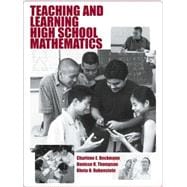
Note: Supplemental materials are not guaranteed with Rental or Used book purchases.
Purchase Benefits
Looking to rent a book? Rent Teaching and Learning High School Mathematics [ISBN: 9780470454503] for the semester, quarter, and short term or search our site for other textbooks by Beckmann, Charlene E.; Thompson, Denisse R.; Rubenstein , Rheta N.. Renting a textbook can save you up to 90% from the cost of buying.
Dr. Charlene Beckmann is a professor of Mathematics at Grand Valley State University. Her research interests include: assessment, cooperative learning, real life uses of mathematics, functions, games, literature and mathematics, technology, how conceptual understanding builds their ability to understand and write proofs.
| Course Introduction | |
| Mathematics Education: Where Do I Stand? | |
| Encouraging Communication in Mathematics Classrooms (Mathematics Strand: Logic and Reasoning) | |
| Unit 1 Team-Builder: Carpet Square Maze | |
| Preparing to Observe Mathematics Classrooms: Focus on Equity | |
| Listening to Students Reason About Mathematics | |
| Developing Questioning Strategies: Conjecturing and Reasoning | |
| Exploring Mathematical Concepts Cooperatively: Reasoning with | |
| Conditional Statements | |
| Using Representations to Investigate Mathematics: Reasoning with | |
| Conjunctions, Disjunctions, and Negations | |
| Learning from Students: Valid and Invalid Arguments | |
| Summarizing Classroom Observations and Listening to Students: | |
| Focus on Equity | |
| Synthesizing Unit One | |
| Unit 1 Investigation: Carpet Square Mazes | |
| High School Students and How They Learn (Mathematics Strands: Geometry and Measurement) | |
| Unit 2 Team-Builder: Transformed Snowflakes | |
| Preparing to Observe Mathematics Classrooms: Focus on Learning | |
| Listening to Students Reason About Geometry | |
| Understanding Geometry Learning: Coordinate Geometry | |
| Building Conceptual Understanding: Congruence and Similarity | |
| Learning Mathematics through Multiple Perspectives: Quadrilaterals and Constructions | |
| Using Physical Tools and Technology: Circles | |
| Tasks with High Cognitive Demand: Measurement in the Plane and in Space | |
| Doing Mathematics: Axiomatic Systems | |
| Summarizing Classroom Observations and Listening to Students | |
| Synthesizing Unit Two | |
| Unit 2 Investigation: Transformations | |
| Planning for Instruction (Mathematics Strands: Algebra and Functions) | |
| Unit 3 Team-Builder: Find Your Function Family | |
| Preparing to Observe Mathematics Classrooms: Focus on Curriculum and Technology | |
| Listening to Students Reason about Functions | |
| Building on Students' Knowledge and Experiences: Understanding | |
| Variables and Linear Functions | |
| Thinking about Learning Outcomes: Exponential Functions | |
| Active Learning: Modeling Data Through Experiments | |
| Teaching with Technology: Geometry of Functions | |
| Increasing Challenge or Accessibility of Problems: Polynomial Functions | |
| Accommodating Different Learning Styles: Rational Functions | |
| Summarizing Observations and Listening to Students | |
| Synthesizing Unit Three | |
| Unit 3 Investigation: Families of Functions | |
| Lesson Planning (Mathematics Strands: Data Analysis and Probability) | |
| Unit Four Team-Builder: A Dream Team in Hockey | |
| Preparing to Observe Mathematics Classrooms: Focus on Teaching | |
| Listening to Students Reason about Data Analysis and Probability | |
| Planning a Lesson Launch and Explore: Data Analysis | |
| Planning a Lesson Share and Summarize: Probability | |
| Blending Direct Instruction into a Lesson: Variability and Distributions | |
| Planning for Alternative Schedules: Statistical Decision Making | |
| Summarizing Observations and Listening to Students | |
| Synthesizing Unit Four | |
| Unit 4 Investigation: Build Your Own Dream Team | |
| Assessment of Students' Learning (Mathematics Strand: Precalculus) | |
| Unit 5 Team-Builder: Conic Conundrums | |
| Preparing to Observe Mathematics Classrooms: | |
| Focus on Assessment | |
| Listening to Students Reason about Precalculus | |
| Daily Assessments: Limits | |
| Rubrics: Rates of Change | |
| Designing and Aligning Tests with Instruction | |
| Alternative Assessments: Accumulations | |
| Summarizing Observations and Listening to Students | |
| Synthesizing Unit Five | |
| Unit 5 Investigation: Conic Sections | |
| Collaborating with Educational Partners | |
| Listening to Educational Partners about Issues in Mathematics Education | |
| Evaluating Curriculum Materials | |
| Coordinating Curricula Beyond the Classroom | |
| Continued Professional Development | |
| Summarizing Interviews on Educational Issues | |
| Synthesizing Unit Six | |
| Table of Contents provided by Publisher. All Rights Reserved. |
The New copy of this book will include any supplemental materials advertised. Please check the title of the book to determine if it should include any access cards, study guides, lab manuals, CDs, etc.
The Used, Rental and eBook copies of this book are not guaranteed to include any supplemental materials. Typically, only the book itself is included. This is true even if the title states it includes any access cards, study guides, lab manuals, CDs, etc.